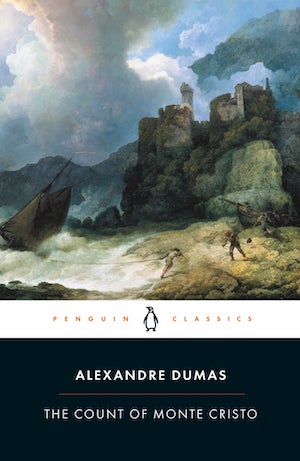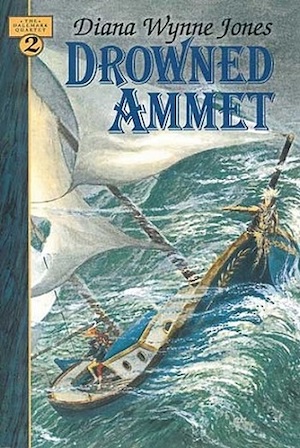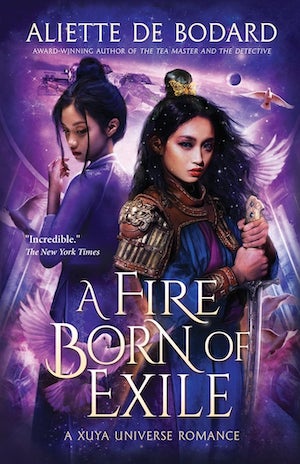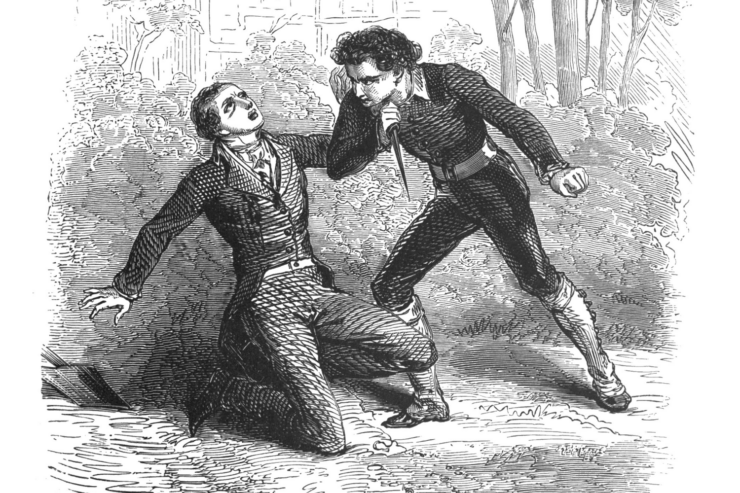Nothing motivates a plot quite like a noble desire to balance the books for past affronts1. Some might denounce such efforts as unreasonable, even deranged. However, none can deny these campaigns are entertaining.
Herewith, five works featuring vendettas.
The Count of Monte Cristo by Alexandre Dumas (1846)

Jealous rivals frame young Edmond Dantès for treason. Edmond is detained and cast into the grim island prison Château d’If. Edmond loses his freedom, livelihood, and most importantly, his beautiful fiancée Mercédès. A promising life wasted, unjustly confined in a dank prison.
However! Fellow prisoner Abbé Faria provides Edmond with a detailed education, then the means to escape, along with the location of a vast treasure. Edmond reinvents himself as the dashing Count of Monte Cristo. Many people in Edmond’s position might put the past behind them and simply revel in their new wealth and status. Not Edmond. He channels his wealth and drive into an impressively convoluted plot to deliver his persecutors to appropriate fates.
I know Count is generally not thought of as science fiction2. On rereading it a number of years ago, I was surprised to find that part of the Count’s program is facilitated by his innovative use of then-novel technologies such as Chappe’s semaphore. As well, while this possibility is eventually ruled out, some of the Count’s new acquaintances initially wonder if he is, like Lord Ruthven, a vampire.
Drowned Ammet by Diana Wynne Jones (1977)

Outraged at the loss of his farm thanks to a predatory tax collector, Mitt’s father joined the Free Holanders to fight against the Earl for freedom and justice! Mitt’s father was swiftly betrayed, arrested, and executed. Mitt’s mother, certain she knows who to blame, raised Mitt to pursue one goal: vengeance on the surviving Free Holanders, the confederates responsible for his father’s death.
Mitt’s plan to assassinate Earl Hadd, get himself arrested, then confess under torture to the involvement of the Free Holanders runs into two small snags. First, his bomb does not kill the Earl (although a sniper’s bullet does). Second, on reflection, allowing the Earl’s men to torture Mitt into confessing does not sound pleasant. Best to simply flee the region in a stolen boat. However, Mitt’s choice of boat to commandeer is unfortunate and brings its own complications.
It is a tough call whether Tanith Lee or Diana Wynne Jones made the strongest case in favour of being an orphan. In this case, for example, Mitt’s mother tries to turn Mitt into a weapon and the Earl is such an unpleasant grandfather and his son so useless a father that the Earl’s grandkids decide to flee the earldom… in the very boat that Mitt steals.
Arcane, created by Christian Linke and Alex Yee et al. (2021)
As an impoverished girl, young Jinx—then known as Powder—relentlessly strove to prove herself to her found family. Tragedy followed. Powder suffered a series of tragic bereavements. She was verbally abused, then seemingly abandoned by her older sister Vi and reduced to living in her city’s gutters.
To say Jinx does not handle rejection well would be an understatement. Adopted by social visionary Silco, Jinx’s talent for violent terrorism is matched only by her volatility and vindictiveness. Indeed, Jinx is as much a danger to her allies as she is to those she decides are her enemies. But at least her efforts move the plot along sharpish.
It is safe to say that the feedback and support Jinx receives from her doting adopted father Silco is heartfelt but profoundly unhelpful. It’s not so much that Silco is a bad dad, although he does have some noteworthy flaws, but that his policy of encouraging and supporting his beloved daughter fails to take into account the fact that Jinx is profoundly mentally ill and extraordinarily homicidal.
A Fire Born of Exile by Aliette de Bodard (2023)

The Ten Thousand Flags Uprising provided Prefect Tinh Đức and General Tuyết an opportunity for rapid, merit-based promotion. The uprising was crushed. Those deemed guilty—or at least, as in the case of scholar Dã Lan, injudiciously frank—were condemned and discarded out of convenient airlocks. In the decades since, the prefect and general have enjoyed immense rank, power, and wealth.
Newcomer Quỳnh is a wealthy but seemingly unremarkable social climber. Or so it seems. Quỳnh is a reinvented Dã Lan, back to exact revenge. In short order, Quỳnh ingratiates herself with the prefect. Victory will surely be Quỳnh’s…were it not for another mastermind’s plot, one that will present Quỳnh with uncomfortable choices.
I could have used this for an essay featuring five books that were clearly inspired by another book without being derivative of that book. A Fire Born of Exile definitely has The Count of Monte Cristo in its lineage3, but is in no sense a recapitulation of the earlier book.
The Fox Wife by Yangsze Choo (2024)

The declining Qing Dynasty is just four years from collapse and cannot offer its subjects justice. Grieving mother Snow will have to make her own justice. Snow blames photographer Bektu Nikan for her child’s death. Snow will do whatever it takes to track down Bektu and kill him.
Snow’s quest might be futile if she were the mortal human woman she appears to be. Snow is in fact a fox woman, with certain supernatural gifts that will prove useful in her vendetta. It’s alarming that the household to which she attaches herself already has a resident fox person, and beyond inconvenient that the photographer has fled China for Japan. However, Snow is a very determined woman.
Readers keen on novels where everything is tied up in a nice package by the end of the book should be aware that vengeance may not provide the tidy closure either reader or mastermind expect. The results can be very messy, ambiguous, or even disheartening. It’s almost as though there is some essential flaw in the concept of relentless vendettas, although I cannot see what it could possibly be.
This being a short list and vengeance being terribly popular, many fine examples are omitted in the list above, The Princess Bride being just one4. Feel free to mention your favourites in comments below.
- Curiously, the schemes that require only that their mastermind do nothing to steer their targets away from self-inflicted disaster are surprisingly hard to carry off. The urge to openly gloat is powerful.
- I wonder if The Count of Monte Cristo holds the record for the most disproportionate ratio between works gleefully lifting the basic plot and readers who have actually read the original novel.
- And I am certain de Bodard has actually read the Dumas, probably in the original French.
- People have argued that the John Wick movies make more sense in one assumes the assassins are all faeries subject to the faery realm’s peculiar rules and obligations. If so, John Wick would be a notable omission.











Two other SFF works which borrow very heavily from The Count of Monte Cristo are Alfred Besters The Stars My Destination and Steven Brust’s The Baron of Magister Valley, which provides the backstory for a minor character in the Vlad Taltos books.
Speaking of Vlad, as a one-time assassin he is often revenge-adjacent if not actually involved, although he does sometimes get directly involved, e.g. in Athyra in which a former target attempts to revenge himself on Vlad.
A revenge plot which is not very similar at all to Count‘s is the one in Dave Duncan’s Ill-Met in the Arena.
Lawrence Watt-Evans’s _Dragon Weather_ also borrows from _The Count of Monte Cristo_.
In several of Saberhagen’s Dracula books various people make the fatal mistake of seriously offending the Count.
I’ve always wondered about Saberhagan’s Dracula books. You don’t hear much about them.
I used to hear a lot about them thirty years ago, not so much lately
Best Served Cold (Joe Abercrombie) is a modern classic in this vein. Not for the squeamish, as the antiheroine climbs over a mountain of corpses to get her revenge.
You beat me to it. Best Served Cold is one of my favorite revenge books.
I love how one person’s quest for vengence has a dark butterfly effect.
Word is that Best Served Cold is being made into a movie starring Rebecca Ferguson, script by Joe Abercrombie, and directed by Tim Miller (Deadpool, Terminator: Dark Fate, and one of the creators of Love, Death, and Robots).
I’m in. A smorgasbord of grotesquerie and humor–I can’t wait.
Of course there’s Suzan Palumbo’s Countess, right there.
And adding to the Count of Monte Cristo inspired texts, too.
Jack Vance’s Demon Princes series, in which Kirth Gerson (inexplicably called Keith Gerson on the back cover of the Panther paperback of Star King) tracks down and kills the five “Demon Princes,” a group of megalomaniac pirates responsible for the enslavement of his childhood home.
https://en.wikipedia.org/wiki/Demon_Princes
The last couple of Harry Potter books sort of fall into this category, I think, though the hero does occasionally think about other things – girls, passing exams, etc.
And the most recent Wallace and Gromit film, Vengeance Most Fowl, pretty much speaks for itself. A complicated revenge plot involving penguins, robot garden gnomes, and the most long-suffering dog in all of fiction
https://en.wikipedia.org/wiki/Wallace_%26_Gromit:_Vengeance_Most_Fowl
Yes, the Demon Princes are among my favorite series
…and quite possibly the smartest, although Gromit may also have a very bad case of Stockholm syndrome.
Oh, my. Is that why dogs seem to like us?
Black Spring by Alison Croggon is an undersung fave; Wuthering Heights remix with a vendetta structure and magical elements.
Zero for five.
Aren’t several of the Stainless Steel Rat books about revenge ?
David Weber wrote a book about revenge, “Path Of The Fury”, and then
https://www.amazon.com/Path-Fury-David-Weber/dp/067172147X
rewrote the book as “In Fury Born”.
https://www.amazon.com/Fury-Born-1/dp/198212573X
“Taylor Varga” is partially about revenge. It is mostly about lizard people and snarking. And writing 2.3 million word books that are not finished yet.
https://forums.sufficientvelocity.com/threads/taylor-varga-worm-luna-varga.32119/
Neal Stephenson’s massive Baroque Cycle series includes at least 2 giant revenge stories intertwined with its mix of history, adventure, and science fiction / fantasy. Extended over decades and thousands of pages.
Trying to think which bible stories are interesting examples of revenge. But I kind of want to exclude ones where the object or objects of revenge are exterminated for offending God, which is probably most cases. Spoilers…… There is the Old Testament Joseph, who pulls a Monte Cristo without actually digging twelve graves. And before that, Jacob and his uncle Laban swindling each other back and forth. Now, if I remember right, Jesus kills a tree and a herd of pigs, but you don’t hear a lot about that in sermons. Edit: I suppose that a tree gets its revenge.
Technically, it’s the demon Legion who kills the herd of pigs; Jesus casts him (them?) out of a possessed person and gives them permission to enter the pigs.
Of course … one could consider the entire Bible a huge revenge story, starting when the serpent tricks God’s pet humans into doing something bad, and ending with said Serpent cast into the Pit along with all his minions and a bunch of other humans he tricked but weren’t God’s special pets.
Ann Leckie’s Imperial Radch trilogy has a warship’s lone surviving ancillary pursuing a vendetta against the multitudinous Lord of the Radch.
Corwin of Amber lights things up in Zelazny’s Chronicles of Amber as much for revenge on whatever siblings wronged him as some sense of justice and rightful inheritance; the man really carries his grudges.
I think that is a strong trope with Zelazny, Lord of Light as well as Jack of the Shadows are stories where revenge plays a significant part.
Yes! In Isle of the Dead, doesn’t he have people keep revenge books?
IMO that’s unfair to Lord of Light, in which the protagonist is trying to break a tyrannical grip. cf A Gift from Earth, on steroids and making (per Brust) a hash of the border between science fiction and fantasy.
The Lies of Locke Lamorra could qualify? Right? Nice bird asshole.
And couldn’t Republic of Thieves as well?
Martha Wells’s The Death of the Necromancer starts with a straightforward revenge plot; it adds additional complications as it moves along, but without minimizing the revenge element.
There’s also Efrel’s plot for vengeance on Netisten Maril in Karl Edward Wagner’s Darkness Weaves.
The Stars My Destination is basically The Count of Monte Cristo in space. “Vorga, I kill you filthy”, as Gully Foyle says.
Please. That’s “…iiiin SPAAAAACE!”
“My name is Inigo Montoya, you killed my father, prepare to die”.
“You’ve got an overdeveloped sense of vengeance. It’s going to get you into trouble someday.”
With respect to the second footnote about the ratio of knowledge about the basic plot versus actually having read the novel, there are at least two strong contenders : Frankenstein, and Dr Jekyll and mr Hyde
Pretty sure Dracula’s up there too…
indeed
Lois McMaster Bujold has a character obsessively plot revenge against his ultimate enemy by way of a made-to-order evil twin of his enemy’s son. The plot is doomed because the villain’s obsessions blind him to certain important facts about both father and son–not to mention Cordelia Naismith!
Fletcher Pratt’s The Well of the Unicorn debatedly starts out as a story of revenge. The protagonist, Airar Alvarson, is originally motivated by the idea of getting back at and ultimately overthrowing the Vulking overlords of Dalarna, whose excessive taxation led to the loss of his family’s farm.
I think A Song of Ice and Fire is all about vendettas. We don’t know if we will ever get to read the last couple of volumes, but one has to wonder as to what Lady Stark is planning to do to the people that betrayed her.
I really enjoyed watching Arcane. A very good story with great animation and an even better soundtrack.
Not to mention Arya’s List.
The Builders by Daniel Polansky. Revenge with anthropomorphic animals.
I’m given to understand that Jinx is one of the most popular characters in the game/lore which inspired Arcane. The antihero worship is strong in this one.
As for vendettas, a certain V would like a word or two, perhaps violence and vindication.
Fonda Lee’s Green Bone books are driven heavily by the ongoing vendetta between rival super-powered ninja gangster clans.
This theme is so integral to fantasy books in particular that it’s pretty ubiquitous. Still –
The Knight of Swords et al. A lot of Moorcock’s eternal champions seem motivated by revenge, but I’ll go for Corum Jhaelen Irsei in particular.
Simon Rack: the Earth Lies Sleeping. An agent for a galaxy spanning law enforcement authority visits some righteous revenge on his homeworld.
Plus an honourable mention to Conan the Barbarian (although you could argue that Conan just gets lucky rather than actively seeking out Thulsa Doom).
wrt the second footnote: The Great Gatsby is somewhere on that list, especially as the population of people sentenced to reading it in high-school English dies off. https://lithub.com/villains-vampires-spies-the-best-remixes-of-the-great-gatsby/ lists a fraction of the knockoffs; in-genre, Molly Tanzer’s Creatures of Want and Ruin is in the neighborhood.
The Count of Monte Cristo stunned me when I first read it in eighth or ninth grade. (My older sister really, really liked Richard Chamberlain in the TV movie.) I still re-read it every few years.
It would make a really fun video game, if you ask me. The semaphore bit could be a puzzle side quest.
Interestingly enough, there is a graphic novel adaptation of The Count of Monte Cristo from Humanoids.
“The Black God’s Kiss” by C. L. Moore comes to mind as one of the purest revenge stories ever.
Didn’t Isle of the Dead by Zelazny have a society where people kept ‘revenge books’ to be updated on a regular basis?
Ha, thank you! I can confirm I read Dumas when I was 11, in the original French, and have since read it about 15 times (once in English translation just for the fun of it).
OK, challenge accepted. I just downloaded a free ebook edition of “The Count of Monte Cristo” from Standard Ebooks, after stumbling badly on trying to read some Project Gutenberg files that were, to say the least, poorly formatted.
https://standardebooks.org/about/what-makes-standard-ebooks-different
The first book is great – ie, the imprisonment, escape etc – but I think it was written retrospectively (ie, after Dumas had written what became the second book). I found it hard to reconcile the young Dante with his later, spider-like incarnation.
Anyone else here remember the short-lived series Life? About an unjustly convicted cop who is exonerated by new evidence, freed, and as part of his eye-watering settlement with the LAPD, allowed to rejoin the LAPD? I wondered at the time if the whole thing wasn’t Charlie Crews’ fantasy as he languished in solitary for the next 60 years. So, what if that’s true for The Count of Monte Cristo as well?
Not sure if it was Dumas’s intention, but it’s a great idea. One common denominator – I googled a synopsis of Life – is that both mcs come into huge sums of means via pretty preposterous means. Wishful thinking or what?